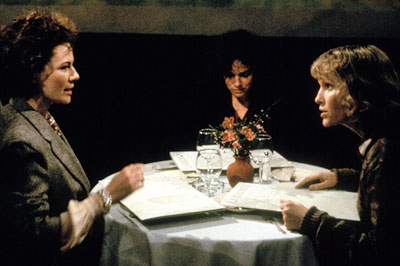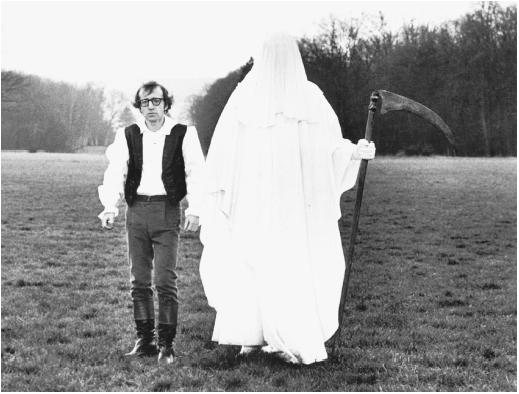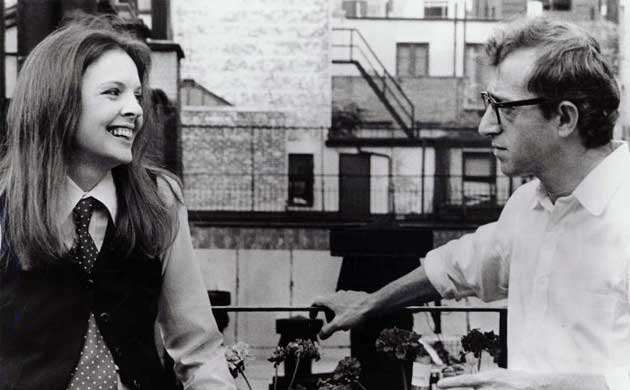
10. Match Point

Match Point has a fitting slow pace, unusually slow for an Allen film. Match Point's plot bears resemblance to 1989's "Crimes and misdemeanours", but it has a different style and a different feel. Match Point is expertly crafted editing-, pacing and directing-wise. It is also a return to form after 15 years of lacklustre light comedies (except The Sweet and Lowdown, Deconstructing Harry, Manhattan Murder Mystery and Husbands and Wives).
9. Broadway Danny Rose

Woody Allen in light comedic mood succeeds well in this charming movie about a manager and his hopeless adultering and drinking client. At the core, Allen employs a melancholic tale of a bygone era replaced by stronger capitalism and artists forgetting about where they came from. Allen's homage to the French New Wave climaxes in one of the final scenes when he runs after Mia Farrow in the rain, with a camera tracking shot from across the street. A deeply charming movie, with some great comedy.
8. Husbands and Wives

Allen's take on Ingmar Bergman's "Scenes from a marriage" is ultimately a fascinating movie where Allen employs his talent for writing intellectual and poignant lines. The handheld-camera and Woody's Cassavettes-like empathy for the characters suits this movie very well. One of his most successful "serious" movies.
7. Radio Days

I love the way Allen gets inspired by other directors and makes his own versions of their movies. Radio Days is clearly inspired by Fellini, but because of Allen's use of his own life and memories it is distinctly Allenesque. I love Radio Days period details, music and its romanticizing of the American 1940's childhood.
6. Zelig

This movie is incredibly well-done and probably Allen's greatest creative output. Zelig is a playful "mockumentary" that really cemented Woody's artistic talent. He really makes the audience believe his cooky kafkaesque story of a human cameleon always changing into different personalities. It really is a profound statement of human's tendency to adapt to other people.
5. Hannah and Her Sisters

This movie's got Sven Nykvist, Max Von Sydow, Mia Farrow, Diane West and Michael Caine all in good form. And it has Woody as Mickey Sachs, one of his funniest and most neurotic characters. This movie succeeds both with the funny parts, and the more serious and dramatic parts.
4. Manhattan

The images is what makes "Manhattan" stand out. Nykvist's exquisite photography of New York City really sticks in your head. Allen's script is also very good, featuring a romance with a very young girl and his problems with intellectual people. This ambiguity is very interesting and Woody employs it in several of his movies. Allen's character hates the intellectual type and at the same time is one himself. He is pushed and pulled between "simple" people and more "intellectual" people not able to define what he prefers.
3. Love and Death

This is Woody's funniest movie, where he pokes fun at the russian culture and its writers. Love and Death showcases Allen's fascination with the Marx Brothers and it works brilliantly.
2. Annie Hall

"Annie Hall" seems fresh even today. It's hilariously funny, intelligent, creative and very entertaining. Woody comments on nearly everything in popular culture and is very laconic and sarcastic all the way through.
1. Crimes and Misdemeanours

This movie has always struck me as quite perfect. The plot is simple: A man contemplates killing his mistress because she threatens to destroy his carreer and family. It shows a man riddled with guilt and moral dillemmas, a human being not percieving himself as evil, but somehow finds himself in a situation where he has to break his own moral codes to keep up his perfect appearance within society. Its Woody at his most nihilistic and it brings up alot of questions. What is morally right or wrong? Could and should we trust other people and listen to what they say? Are we ultimately on our own?











